

2012_Viacom. Viacom v. YouTube Postscript—Copyright Infringement, Social Media and the Blurred Lines of the Digital Millennium Copyright Act's Safe Harbors. By Fernando A.
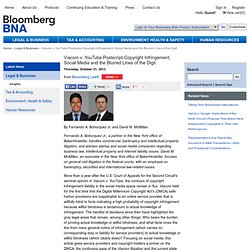
Bohorquez Jr. and David M. McMillan Fernando A. Bohorquez Jr., a partner in the New York office of BakerHostetler, handles commercial, bankruptcy and intellectual property litigation, and advises startup and social media companies regarding business law, intellectual property and internet liability issues. David M. More than a year after the U.S.
Congress enacted the DMCA in 1998 to update federal copyright law in light of the new and unprecedented challenges presented by the Internet.1 Title II of the DMCA--the “Online Copyright Infringement Liability Limitation Act”--creates a series of safe harbors that help shield Internet service providers from copyright infringement liability and thereby encourage innovation in the developing social and commercial space. After establishing the threshold criteria, a service provider such as a social media entity must then satisfy the requirements of a particular safe harbor. The Aereo and ReDigi decisions: courts continue to wrestle with the application of copyright law to the redistribution of digital content. A series of recent decisions in the Second and Ninth Circuits—including Viacom v.
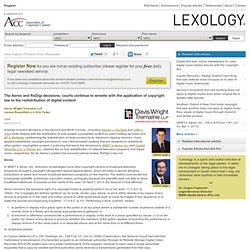
YouTube and UMG v. Veoh (both dealing with the distribution of user-posted copyrighted content by video hosting services) and AP v. Meltwater (addressing the redistribution of news content by an electronic clipping service)—have applied established copyright principles to new internet-based systems that are designed to redistribute other parties’ copyrighted content. Continuing that trend, the decisions in WNET v. Aereo, Inc. and Capitol Records, LLC v. Youtube. Viacom v. YouTube ruling is a bummer for Google and the UGC community. After five years in the courts, the Viacom International, Inc., v. YouTube, Inc. litigation has finally produced an appellate opinion. The result is a loss for Google/YouTube and the user-generated content (UGC) community generally. While the court largely agrees with many of YouTube's contentions (and the ruling of the lower court), it nevertheless revives the litigation, ensuring that Google will spend millions of dollars more over the coming months and years.
Furthermore, the opinion identifies at least four "holes" in 512(c) coverage that future plaintiffs will surely attempt to exploit: smoking-gun internal e-mails, willful blindness, right and ability to control, and content syndication. This ensures that other UGC websites will spend a lot of money upfront to try to shut down those holes and spend even more money in litigation to demonstrate that it avoided those holes.
Viacom Didn't Actually 'Win' Against YouTube, But The Appeals Court Ruling Is Still Dangerous. Second Circuit Ruling in Viacom v. YouTube Is a Bummer for Google and the UGC Community. By Eric Goldman Viacom International, Inc., v.
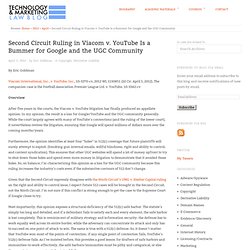
YouTube, Inc., 10-3270-cv, 2012 WL 1130851 (2d Cir. April 5, 2012). The companion case is the Football Association Premier League Ltd. v. YouTube, 10-3342-cv Overview After five years in the courts, the Viacom v. Furthermore, the opinion identifies at least four “holes” in 512(c) coverage that future plaintiffs will surely attempt to exploit. Given that the Second Circuit expressly disagrees with the Ninth Circuit’s UMG v. Most importantly, this opinion exposes a structural deficiency of the 512(c) safe harbor. Even though Viacom won this ruling, I still don’t understand how Viacom is making progress towards any strategic objective that matters to it. [UPDATE: This post is unintentionally a little contrarian; many folks see this ruling as a win for Google and the Internet. Analysis of the Court’s Discussion 512(c)’s Applicability to Direct and Secondary Infringement Knowledge of Infringing Activity. YouTube prevails in huge copyright suit with Viacom.
A federal judge in New York sided with YouTube, once again, in the long-running… (Kiyoshi Ota / Bloomberg ) In an epic clash between old and new media, Google Inc.'s video website YouTube has scored another huge victory in the long-running skirmish over copyright infringement brought by television giant Viacom Inc.
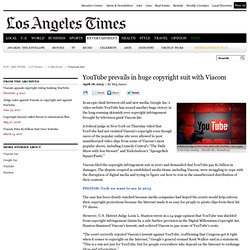
A federal judge in New York on Thursday ruled that YouTube had not violated Viacom's copyright even though users of the popular online site were allowed to post unauthorized video clips from some of Viacom's most popular shows, including Comedy Central's "The Daily Show with Jon Stewart" and Nickelodeon's "SpongeBob SquarePants. " Viacom filed the copyright infringement suit in 2007 and demanded that YouTube pay $1 billion in damages. The dispute erupted as established media titans, including Viacom, were struggling to cope with the disruption of digital media and trying to figure out how to rein in the unauthorized distribution of their content.
Google again beats Viacom in YouTube copyright case. YouTube wins Viacom copyright suit. As widely reported this morning, yesterday US District Judge Louis L Stanton granted summary judgement to YouTube in the long-running copyright dispute brought by Viacom.
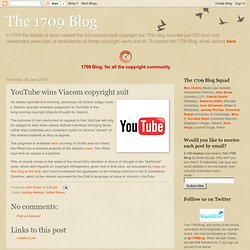
The outcome (if not overturned on appeal) is that YouTube will only be obliged to take down clearly defined individual infringing items, rather than undertake any consistent action to remove "clones" of the deleted material as they re-appear. YouTube prevail again against Viacom claim.